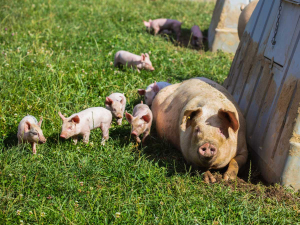M.I.A.
OPINION: The previous government spent too much during the Covid-19 pandemic, despite warnings from officials, according to a briefing released by the Treasury.
 Pork NZ says the country’s pig farming industry relies on experienced workers from overseas to meet a shortfall in staff with the necessary skills required to work with the country’s pig herd.
Pork NZ says the country’s pig farming industry relies on experienced workers from overseas to meet a shortfall in staff with the necessary skills required to work with the country’s pig herd.
Pig farmers have joined a growing chorus in the primary sector calling on the Government to urgently review its migrant worker policies in the wake of Covid-19.
Both agricultural contractors and dairy farming organisations have also recently asked for rule changes around migrant workers.
“Each year, New Zealand’s pig farming industry relies on experienced workers from overseas to meet a shortfall in staff with the necessary skills required to work with the country’s pig herd,” explains NZ Pork chief executive David Baines.
He says the pig industry is concerned that skilled migrants already working on pig farms in New Zealand may not have their visas renewed or existing workers trying to return from overseas visits will be blocked, leaving many farmers with significant staffing shortages.
“The sector’s strong preference would be to have a pool of available skilled and unskilled New Zealand workers,” Baines claims.
“However, pig farming is a relatively niche sector in New Zealand and the reality is that there is a significant shortage of New Zealanders applying for these roles.”
He says the pork sector relies on a supply of skilled migrant workers who have been trained in their home countries.
“The numbers in total are small, particularly compared to major industries such as dairy, but the productivity of the industry is very vulnerable because of the precision nature of pig farming.”
Baines says NZ Pork has requested an urgent meeting with the Minister of Immigration Iain Lees-Galloway to discuss the issue.
He says pig farmers have raised concerns that migrant staff may not have their visas renewed this year.
“Or that migrant workers cannot currently enter New Zealand and that existing staff on visas are facing difficulties returning from overseas visits as a result of immigration measures taken in response to the Covid-19 pandemic.”
Baines says other issues include the cost of visas, processing times, a lack of pathway to residency and a lack of consistency from Immigration New Zealand in terms of visa length and conditions.
“While we recognise that Covid-19 has and will continue to leave New Zealanders out of work and hopefully create some opportunities locals who are prepared and willing to work on pig farms,” Baines added.
“The sector cannot wait for such people to perhaps become available. Our animals need continuous skilled and committed care to be provided.”
Legal controls on the movement of fruits and vegetables are now in place in Auckland’s Mt Roskill suburb, says Biosecurity New Zealand Commissioner North Mike Inglis.
Arable growers worried that some weeds in their crops may have developed herbicide resistance can now get the suspected plants tested for free.
Fruit growers and exporters are worried following the discovery of a male Queensland fruit fly in Auckland this week.
Dairy prices have jumped in the overnight Global Dairy Trade (GDT) auction, breaking a five-month negative streak.
Alliance Group chief executive Willie Wiese is leaving the company after three years in the role.
A booklet produced in 2025 by the Rotoiti 15 trust, Department of Conservation and Scion – now part of the Bioeconomy Science Institute – aims to help people identify insect pests and diseases.